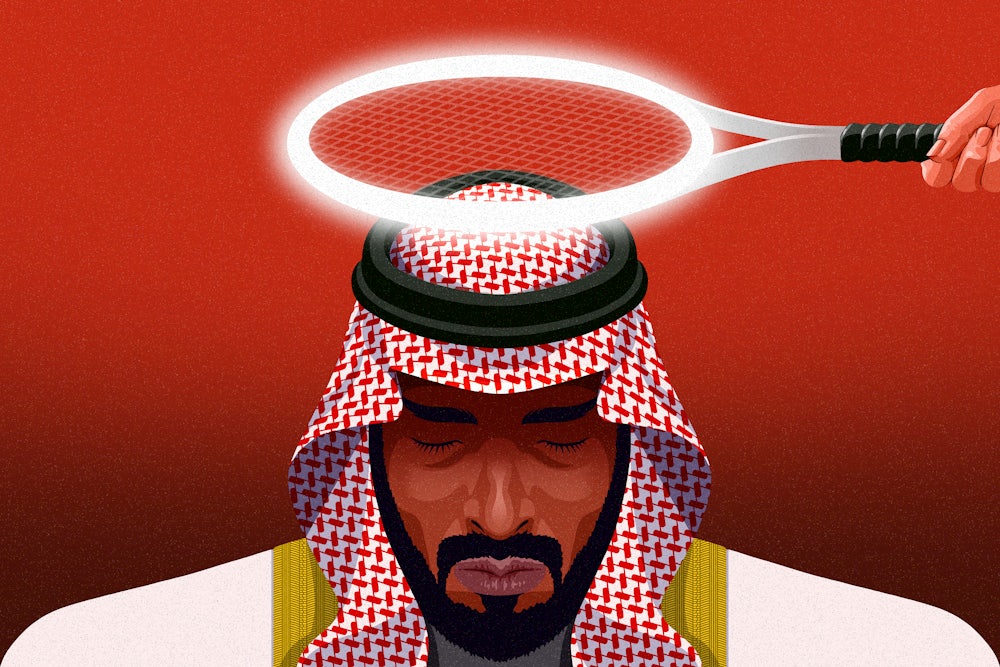In recent years, Saudi Arabia has been flexing its financial muscle in international sports. And despite the country’s dismal human rights record, an increasing number of athletes, teams, leagues, and even entire sports have become part of the Saudi portfolio. On episode 71 of The Politics of Everything, co-hosts Laura Marsh and Alex Pareene discuss whether women’s tennis, with its legacy of social activism, will ultimately wind up there too.
Alex Pareene: Nation-states and oligarchs have spent the past two decades buying athletes, teams, and recently, in the case of Saudi Arabia, even entire sports. With that history in mind, the tennis world was watching closely when Saudi Arabia bid to host this year’s Women’s Tennis Association Finals.
Laura Marsh: Other cities bidding to host the season-ending tournament included Washington, D.C., but for several weeks leading up to the decision, most of the speculation centered on Saudi Arabia.
Alex: A repressive, theocratic monarchy where women have few individual rights and political dissidents are regularly jailed or executed might seem an unlikely fit for a sport with a tradition of social activism and forceful advocacy for gender equality, raising the question not just of why the WTA would consider playing in Saudi Arabia but why the kingdom would even want to play host to women’s tennis to begin with.
Laura: The WTA has made its decision for this year. It went with a less controversial location, Cancún, but that’s a one-year deal. And some in tennis are worried that a Saudi-hosted final is still a strong possibility for the future. The sport is notoriously strapped for cash, and Saudi Arabia is in the middle of a campaign to purchase entry into international sports at any price.
Alex: Today on the show, we’re asking what almost led women’s tennis to Riyadh, and how likely it is that they’ll still end up there. I’m Alex Pareene.
Laura: And I’m Laura Marsh.
Alex: This is The Politics of Everything.
Alex: One reason the Saudi bid for the WTA Finals was so fraught is that earlier this year, the Saudi-backed LIV Golf tour merged with the Professional Golfers Association. According to the New Republic staff writer Alex Shephard, the money involved in that deal, rumored to be more than a billion dollars from the kingdom’s public investment fund, made the merger seem more like an acquisition. And the kingdom’s first major foray into what is traditionally a Western sport is unlikely to be its last. Alex, welcome to the show.
Alex Shephard: It’s good to be back.
Alex: So the term sportswashing has been with us for a couple of years now, but it has very much become a part of the public discourse more recently, even including with Senate hearings, especially on the moves by Saudi Arabia. Now I think you and I know, unsavory people have been making money in sports for a very long time. Unsavory people have been owning sports for a very long time. So what is different about what’s going on now?
Alex Shephard: The big difference, and I think it’s a pretty important one, is that we’re talking about nation-states now, right? It used to be that the person who owned the team owned a factory in the city—
Alex: Wrigley Field or whatever, right? It was a Local Important Person.
Alex Shephard: Yes, exactly, and that slowly morphed into, in some cases, private equity groups or other funds. Sometimes you just have straight-up rich people, but what we’ve seen steadily growing over the last 15 years or so is the interaction of nation-states themselves, particularly either nation-states connected to the Gulf or, in the case of Chelsea Football Club, a Russian oligarch, which is what kind of kicked off this entire thing. You’ve started to see ways in which petro states can start to intertwine themselves with the West, and they’re doing this, partly, I think, to rehabilitate mostly rather tawdry reputations, but they’re also doing it to gain influence within these sectors, and they’ve been remarkably successful.
What we’ve seen, really since Saudi launched LIV, is that they’ve made the most aggressive push to more or less take over sports wholesale.
Alex: Yeah. That seems pretty bold and dramatic, I guess, to not just come in and buy a team but to take over a sport. Are they in this just to make money, or is it something more than that?
Alex Shephard: Well, it depends on who you talk to, but I think that the best way to understand it is to think about both of them simultaneously. So one is that Saudi Arabia is a country whose sole export is oil, and oil is on the decline, so they’ve embarked on this multipronged strategy to diversify their economy. And one of the reasons why they want to do that is they want to have the level of influence that they have right now. So they looked at sports as an opportunity.
And that is partly because sports themselves tend to be economically badly managed. With the PGA, for instance, a lot of golfers were upset that they were not making enough money, and Saudi created this kind of tatty, gaudy alternative, and it sucked, and nobody liked it, but they were paying people so much money—essentially the PGA had no choice but to engage with them.
I think also, domestically, Mohammed bin Salman, the crown prince who runs the country, is obsessed with the Arab Spring, and there’s a population in that country that is, I think, 70 percent under the age of 35 right now. There’s real concern about what happens when you have a youth population that’s that large. So part of this is a kind of bread and circuses campaign, right? Sports that they’ve largely targeted are ones that play into ideas of Saudi masculinity. Golf is an exception here, but when you look at what they’re actually doing, it’s Formula One, it’s fast cars, it’s boxing and mixed martial arts, and it’s also football, right?
Alex: Even professional wrestling too.
Alex Shephard: Yeah, and wrestling as well. Then there’s another dimension, which is there’s an effort, I think, partly to just rebrand Saudi Arabia as a place where you can go and have fun, like Dubai. But also, particularly after the murder of Jamal Khashoggi and the fact that Saudi Arabia has overseen a brutal war in Yemen that has led to hundreds of thousands of deaths, this is also an effort to present a sort of kinder, gentler version of Saudi Arabia to the wider public. And that’s what we call sportswashing. It’s this idea that you can get away with executing 100 people, as Saudi Arabia has this year, if people also have to say, “Well, it’s too bad about the public executions, but I do really like watching Cristiano Ronaldo and Karim Benzema play soccer.”
Laura: Right. Especially the murder of Jamal Khashoggi is still fresh in the minds of people in this country, and there have been a lot of objections to what happened with the PGA. What are the concerns, and what are the risks for sports leagues entering into these alliances and partnerships?
Alex Shephard: Some of the concerns are also just, you know, the PGA is a tax-protected entity, and it’s seen as being part of the American cultural firmament. And I think that there’s concern particularly among Congress about the intertwinement of essentially an American cultural institution with a Saudi state whose relationship to the United States is quite shaky.
There are economic concerns about what this will actually mean because, essentially, the new entity is arguing that they should still be tax-exempt, which is ridiculous. And then again, I think there’s also larger concerns about what this will actually mean in a wider sense.
If you think about Russia, that’s actually an interesting way to look at this, right? Russia had embarked upon a slightly similar campaign, in which various oligarchs connected to Vladimir Putin had started to invest quite heavily in the West—the most famous of which was the owner Roman Abramovich of Chelsea Football Club, who bought it in 2002. And all of a sudden one day Russian tanks roll into the outskirts of Kiev and you have a very complicated economic situation. This is truer in the U.K. than it was in the U.S., but I think that the risks here are kind of twofold.
One is just that there could be another Khashoggi murder, right? That could happen at any time, but I think from another perspective, what you’re also seeing are cultural issues. These are sports leagues that have gotten more interested in social issues in a lot of ways. They’ve advocated more for diversity; there’s been more public shows of support for LGBTQ people. One of the things that concerns me the most is that we’re seeing a slow degradation of that, and I think it’s useful here to just point to one thing, which is Jordan Henderson, who was the captain of my favorite soccer team, Liverpool Football Club, for many years. He was one of the people who really emphasized this idea that soccer should be inclusive, and this summer, Saudi Arabia backed a dump truck full of money in front of him and he took it. Now he has had to kind of go and say, “Oh, actually Saudi Arabia is really nice. They told us that there was slave labor in Qatar when we went there, but then I met some workers arranged by Qatar and it was actually really nice.”
I think the lesson that a lot of people are going to take from this is, “One day, I may want to take that dump truck full of money from Saudi Arabia, and my advocacy on behalf of social justice will be a hindrance to that.”
Laura: Although the other argument is, if you’re someone who’s talking about these issues, then you’re also a very useful person to buy off.
Alex Shephard: Exactly, and that automatically diminishes the kinds of human rights arguments that you hear. And that I think is really important. Saudi Arabia has also tried to money the waters because all of this is being done by the sovereign wealth fund, which, when it’s convenient for them, as when Saudi Arabia bought Newcastle United, they say, “Oh, we’ve given legally binding assurances to the Premier League that the sovereign wealth fund of Saudi Arabia is not connected to the state.”
Alex: Haha. Yeah, it’s interesting too because Senator Richard Blumenthal has been holding hearings on Saudi investment in sports, and the argument they have made there to not show up for these hearings, essentially, is, “We are a sovereign for a nation, and you can’t compel us to show up,” but at the same time, “we’re also just a normal business doing normal business things here.”
Alex Shephard: Yeah, and I think what you’re seeing everywhere is that because there’s a fire hose of money, nobody really cares, right?
Alex: Yeah, of course.
Alex Shephard: Can I actually say one more thing just because I think that there’s an interesting wrinkle here? There’s this guy, Malcom, who’s this Brazilian striker, and he was playing for Zenit Saint Petersburg for a long time. And he’s not good. He’s better than I am, but he’s not that good. And Saudi Arabia has largely been more opportunistic than strategic in how they’ve acquired players. They went to Zenit Saint Petersburg, and they said, we’re going to give you 60 million euros for Malcom. And you say, well, why would they do that? Well, Russia’s economy is in the tank right now.
Zenit Saint Petersburg, by the way, is owned by Gazprom, the Russian energy company. Normally, if you have a situation like that and you want to help your friend out, you trade with them, but unfortunately, Saudi Arabia’s only export is also Russia’s only export as well too, right?
So what do you do? I don’t know how often it can work this way, but one way of looking at the public investment fund is as a cash infusion to Russia. And I think that’s one of the things that people are not thinking about with this kind of stuff.
Alex: It’s not just laundering a reputation. It could literally just be laundering actual bills.
Laura: The other thing I think that’s really interesting is that the LIV-PGA merger isn’t just a story of greed because there were people who held out and said, no, I don’t want to go and play for LIV Golf, and those people were thoroughly screwed over.
Alex Shephard: Well I think that’s the lesson that everyone is taking. They’re saying, “Well, if we don’t get the money now it might not show up later.”
Alex: And you’re not going to get rewarded for taking a stand.
Alex Shephard: Yeah, I think as you saw with somebody like Rory McIlroy, right? One of the best golfers in the world, who not only held out but spoke out quite aggressively against LIV and then ended up looking like a fool because he stood with the PGA.
Laura: Do you think there’s anything that could come out of the congressional hearings?
Alex Shephard: I think it’s going to be very interesting to see how Democrats and Congress play it. I think the cleanest way is to just block it on antitrust grounds, but I’m not particularly confident that that happens. Again, I think unbaking this stuff, as we’ve seen in soccer, is just really, really hard.
Laura: I was actually just about to ask you about that because the most significant government action against this has been when the U.K. forced the sale of Chelsea after the Russian invasion of Ukraine.
Alex Shephard: I think that’s the sort of model here, but you’re talking about one team, right? There are basically still always people who want to buy teams. When you start talking about entire leagues, things get quite complicated.
Alex: There’s not going to be someone who’s going to step in with the amount of money to be like, “I’m going to take over this sport.”
Laura: Well, I also wonder if the lesson from Chelsea for authoritarian governments who want to invest in sports is you better do it on an epic scale, where it’s very hard for the government to force the sale of all of your assets because forcing the sale of one team is doable. It’s actually still a huge deal, but it’s doable. Forcing the sale or divestment of the number of things Saudi Arabia is in right now would be a complete overturning of American sports.
Alex Shephard: Yeah, I think you get into another situation where the human rights element, as much as we talk about sportswashing, it doesn’t factor in enormously. You can easily see yourself in a situation where—unless we’re flying fighter jets over Riyadh or something—in which Saudi Arabia could commit any number of unpardonable human rights violations and a bunch of golfers will still say, “Well, I have no choice. What else am I going to do? There’s no other place for me to go.”
Alex: Alex, thank you so much for talking to us today. Good to see you again.
Alex Shephard: Thank you.
Laura: Read Alex Shephard’s article, “Saudi Arabia’s Dizzying Scheme to Devour the Sports World,” at NewRepublic.com.
Alex: After the break, we’ll talk about how the prospect of Saudi money has roiled professional tennis.
Laura: This fall, and for the next four years, the Association of Tennis Professionals, or ATP, will play its big-money Next Gen Finals in Jeddah. During the U.S. Open, the Women’s Tennis Association revealed that one of its bidders for its year-end tournament was Riyadh. Amid public blowback, the WTA went with a different bid this year.
Jon Wertheim, executive editor of Sports Illustrated, has written extensively about the negotiations with Saudi Arabia, as well as the complex economics of professional tennis. Jon, welcome to the show.
Jon Wertheim: Thank you. Good to be here.
Laura: So the Next Gen Finals is a high-profile event on the men’s tour. I just want to talk about why it would be held in Saudi Arabia—is there a large audience for tennis?
Jon: There is a one-word answer why the Next Gen Finals would be held in Saudi Arabia. As you can imagine, it’s money. This is an event where the men’s tennis tour tries to showcase their young talent and here comes Saudi Arabia, which has obviously made this foray into sports, and they put out a bid.
One thing that’s interesting about this is that, initially, this was supposed to be mixed—men and women. But as I understand it, the deal terms were such that the women could not abide that. So you have this year-end event showcasing young talent in Saudi Arabia and, concurrently, there were talks for the women to hold their main final there [with] all the top players—not just the young stars but the top eight players; Coco Gauff and Iga Swiatek. You had this very strange fact pattern where everybody wants to compensate athletes fairly; every tour, every organization wants big fat checks, but it was pretty fraught for all sorts of reasons. Not least, they had just come from this other deal that fell through because, what I had been told is, neither party was willing to agree to pay equal prize money. So this whole issue of sportswashing, I thought, had this crucible moment in women’s tennis that played out.
Laura: Can you talk us through some of the concerns—the equal prize money, but also other concerns—about having the women’s end-of-year tournament in Saudi Arabia?
Jon: Yeah, I think everyone that does business in Saudi Arabia, but I think sports in particular, have had to do this calculus and, how much do some of the concerns over human rights and criminalizing homosexuality and some of the reasons that have given pause in the past—how much does that matter?
Women’s tennis was really interesting because, first of all, this was a tour that had held their last final event in China. You will remember perhaps, two years ago, there was a player who had allegations against a high-ranking official in the CCP, and women’s tennis essentially said, “We cannot do business here. Our values are not aligned with this country. We’re out.” And this came at a huge economic cost, so they had left China on these ethical grounds, and then they were going to park their event in Saudi Arabia two years later.
Laura: That seems really inconsistent, right? You’ve written about this a bit and, one could imagine they’re actually regretting taking that principled stand against China and trying to step away from it because it did cost them a lot.
Jon: I don’t think there’s, there’s ethical regret. I think women’s tennis thought, we’re going to have a lot of support, and they did a victory lap on global affairs shows, but this really blew holes in the balance sheets. I’m told that their revenues were down about 30 percent because of this decision. I think they basically said, “We need to right this ship and hold our nose and essentially put ourselves out to the highest bidder. Lesson learned.”
Alex: I wanted to step back a bit and just ask a really basic question, especially if you don’t follow tennis: These deals are about money. Why does tennis need the money? How do tennis players get paid?
Jon: Tennis players get paid two ways: in prize money and endorsements. The real issue here is that the tour, the WTA, the governing body, they get the bulk of their revenues from this year-end event. So, Coco Gauff plays U.S. Open. She makes millions and millions of dollars. It’s a great story. She gets these endorsements. The U.S. Open makes all this money. There’s suites and television contracts and tickets. The Women’s Tennis Association—the league basically in which Coco Gauff plays—doesn’t necessarily make great revenue from these big-ticket events. They make the bulk of their revenue from this year-end event.
Laura: The interesting thing about this event, though, is the players would have to go there. Were there any assurances made to the women players, for instance, about dress or their conduct in Saudi Arabia? And I’m also wondering if you could talk about some of the concerns about players who are queer or would be concerned about the treatment of gay people in their country.
Jon: That’s a great question because all of this happened fast. This event is going to happen in about six weeks and it was only announced one week ago. So basically, a lot of the players, and a lot of the agents, and a lot of some of the behind-the-scenes people said, “Listen, we’re not necessarily putting a blanket ban on Saudi Arabia, but we need to ask a lot of questions. We need to see the site, we need to know about attire.” There was a professional wrestling event where the women weren’t allowed to wear their usual costumes. There are queer players on the WTA tour, and some of them have already been very outspoken saying, I wouldn’t feel comfortable there.
The other thing that’s interesting: I was in Saudi Arabia for a sportswashing story for 60 Minutes, maybe nine months ago or so, and I went to one tennis event—and I’ve seen high school tennis matches played before bigger crowds. So part of this is, do you want to go halfway across the world? You don’t know what you’re getting. You don’t know how accepted you’ll be. A lot of these players fashion sort of social activism as part of their brand. Does it undercut that if suddenly they’re taking this money? They also don’t even know if there are going to be fans in the stands.
So I think that the women’s tennis tour essentially said, we need to really hit the pause button, answer some of these exact questions that you’re raising. I anticipate they will be playing there in 2024.
Alex: I’m just sort of wondering, from the Saudi side, what they get out of it, if it’s not something where tennis has a huge following there. Why do they want this tournament there?
Jon: This isn’t about media rights deals and selling tickets and the usual reasons why people invest in sports, at least in the United States.
What’s going on in Saudi Arabia is something altogether different. It’s this “Vision 2030,” where Saudi Arabia wants to rebrand itself and having Coco Gauff come in Saudi Arabia and pose with high-ranking officials and eat local cuisine and sort of everything you get with an endorsement, I think that’s really what’s driving this. It’s not because there’s this burning desire for Saudis to watch high-level tennis, the same way it’s not necessarily why they’re having heavyweight boxing fights or WWE events or Formula One races either. This is something much bigger than just fans wanting to watch athletes.
Laura: The men’s tour has been much less wary of going there. What’s the calculation on their side? How’s it different?
Jon: It’s a really good question: Why isn’t there this blowback when the men have gone to Saudi Arabia? I think that’s a fair point. In theory, a country where people are being oppressed, that ought to bother everyone.
I do think that with women’s tennis, this whole tour—since its inception—was founded on these concepts of social justice, and Billie Jean King, who turns 80 years old in a few weeks, is still very much the figurehead. I’m not sure it’s a double standard. I think it’s a different standard, just because social justice and equity and diversity and equal prize money is so part and parcel with women’s tennis.
Alex: Yeah, you can see, even the ads for the U.S. Open here celebrate 50 years of equal prize money, right?
Laura: So we went through this debate when the WTA was making the decision, and that’s been resolved now, but looking ahead, there’s a summit coming up at the end of this month between the ATP and WTA about possibly merging their tours. How do you see that playing out in the next few months?
Jon: I think everyone’s looking to golf and what happened there and saying, that’s what we don’t want to happen. I think that the fear is that if tennis doesn’t have this unified front, the Saudis are just going to say, “You know what? We’re just going to do what we did with golf. Instead of asking for one tournament, we’re just going to buy out the whole tour.”
Laura: How do you see the concerns of the two different sides being weighed, though? The ATP has more muscle, right? The men do earn more money. Is there a danger that the WTA’s concerns get pushed off to the side in this process?
Jon: Yeah, I think that’s a real concern. I’ve talked to a lot of people who said, look, the men aren’t about equal prize money. The men don’t see this as a 50–50 partnership. They didn’t stand by the women when the women took the stance on China. The men were happy to continue going to China, and I think that that’s something that concerns a lot of the women.
Laura: Also, you mentioned what happened in golf. Are there any differences between the structures of those leagues, tennis versus golf, that might give tennis more of a protection? Or is it a really similar situation with similar vulnerabilities?
Jon: Yeah, I’d say similar, not identical. One thing you don’t have in golf is this overlay of men and women, right? You go to the U.S. Open, and the men and the women, they play together. Coco Gauff finishes her match, and on comes Djokovic. And you have all these combined events, and you have fans who are fans of both. The other thing is that tennis is so much more global than golf. If you’re living in Western Europe, as most of the top tennis players do, Riyadh is actually closer than coming to the United States, much less going to Asia. I think tennis is a more global sport, and also tennis is a sport where men and women really intersect. I think that makes it different, but that can be as much a curse as a blessing.
Laura: John, thank you so much for coming on the show.
Jon: A pleasure. Thanks.
Alex: Jon Wertheim is a correspondent for 60 Minutes and an analyst for the Tennis Channel. You can read his writing on tennis at SI.com.
Laura: After the break, we’ll discuss the particular financial pressures facing the women’s game and possible paths forward.
Alex: Women’s tennis is among the most popular sports—not just women’s sports but sports, period, in the world. The idea of a professional league at that level essentially needing to beg for money and sponsors is a bit perplexing. But the sport’s dalliance with Saudi Arabia is not the first time in recent memory that the Women’s Tennis Association has confronted a similar ethical dilemma.
In 2021, the WTA suspended events in China over concerns for the safety of a player who had accused a high-ranking government official of sexual abuse. The move caused the WTA considerable financial hardship. Some now attribute the WTA’s interest in a Saudi event to the money problems caused by that decision.
Caitlin Thompson is the publisher of Racquet magazine, which recently argued that tennis is unlikely to resist the Saudi kingdom’s involvement in the sport—but it should. Caitlin, welcome to the show.
Caitlin Thompson: Thanks for having me.
Alex: To back up a bunch, part of the background here is the WTA having financial trouble or needing money in part because of what happened with China a little while back.
Caitlin: Yeah, you’re correct in categorizing the WTA as being in a tricky position financially. Not only because of what recently happened in China—even before that, the women’s tennis tour has been in a bit of a precarious financial situation.
When I was growing up, the tour had title sponsors. Those listeners who might remember, the first couple of decades of the Women’s Tennis Association, the women’s tour, which celebrated 50 years of existence this year, was originally the Virginia Slims tour. There have always been a lot of brand dollars associated with title sponsorship of the women’s tennis tour, and that hasn’t existed really since the disappearance of the Sony Ericsson brand partnership, which happened more than 10 years ago. They’ve now signed a deal with Hologic, which is like a sports-data-health-tech company. But really, the money problems have gone far beyond just sponsorships.
Alex: Seen in that light, it makes it both more understandable but also more striking that they would be considering taking money from Saudi Arabia, in terms of guarantees for player security and safety and the sort of ramifications of what it means to be involved with repressive foreign governments. It seems like there should be even more heightened awareness around it.
Caitlin: It’s interesting. There is heightened awareness, certainly of the safety and sort of bodily autonomy of a lot of these players. But also, there is—even from within their own organization—a lot of dissension about the opportunity to earn money.
Some of them have been very vocal and outspoken about not feeling safe traveling to certain countries, and some of them have basically just said, I’m here to make money. And it’s unfortunate because I think it misses some context when you frame it as, should we be safe or should we be paid? I think that’s an oversimplification that actually isn’t necessarily at odds. But I do think the leadership of the WTA is in a bit of a tough spot because they don’t have a unified player voice that is in agreement about what it should do.
Alex: Yeah, and I can totally sympathize with and understand the player point of view that, effectively, if the men can go take this money and it’s no big deal, why is it such an issue for us? That makes perfect sense.
Caitlin: Unless you’re a really sort of outspoken and educated player and, keep in mind, and this is not a denigration at all, but most professional athletes are not necessarily schooled in the art of political protest.
Alex: They’ve been doing it since they were young. They’ve been doing sports since they were young.
Caitlin: Correct, and that doesn’t necessarily lend itself to—
Alex: A sophisticated understanding of geopolitics.
Caitlin: Correct. Especially if you add in the context, especially on the women’s side, although it’s affecting both tours, of the current sort of boycott of Russian and Belarusian tournaments and the participation of Russian and Belarusian athletes at certain tournaments and in certain contexts. It’s this sort of really complex geopolitical conversation because there are players from almost every country, certainly every superpower, with a lot of very different stakes.
Laura: I understand the complexity of debating it in the abstract as kind of a social justice issue, but the incident with Peng Shuai illustrated that this isn’t an abstract or broad political discussion. It raised the possibility that top players themselves could actually be in danger. I think one of the main concerns about going to Saudi Arabia is, this is a country where women have very limited rights.
How do you square that with sending some of the most successful female athletes in the world to that country, and can you guarantee the safety of those people, and the teams around them?
Caitlin: Yeah, it’s a valid question. To be clear, they have not yet agreed to take Saudi money or events in Saudi Arabia. It should be said, they had a huge opportunity, and it was rumored to be happening during the U.S. Open, and there was a lot of dust-up. There was a lot of back-channeling. I spoke to several players, several people I know on governing-body organizational committees who were all talking about how this almost happened and how that means it could happen in the future, but it didn’t. I think a lot of the reason it didn’t happen, and they announced that the WTA Tour Finals would be in Cancún this year, is because there was a backlash to the notion of going to Saudi Arabia among stakeholders, among the audience members, among players themselves. It should be noted that even though this is very much up for consideration, as are a number of things, they had the chance, and they didn’t take it, at least not yet.
I think one of the things that I can share in terms of insight that is driving a lot of this conversation is the idea of equal pay. I think the tours don’t generate an equal amount of revenue. Part of that has to do with the traditional subjugation of women’s sports, the way that the rights are negotiated, the way that the title sponsorships are negotiated. But because they’ve made this commitment—and by they, I mean most of the tennis ecosystem and tournaments have made a commitment to equal pay despite not generating equal revenue—a lot of the new investment and a lot of the ability to generate new dollars has gone into paying players equally, as opposed to investing in things that could ultimately make the league more valuable.
So it’s an optics-versus-investment strategy that I think, again, is very shortsighted, and there’s not been a tremendous amount of outside thinking or outside innovation. And you have a lot of cases where people are motivated only in the short term.
Laura: Is anyone talking about other potential routes forward? Because it seems simple to frame this as: We either take the money from Saudi Arabia or we’re under threat. I think that argument’s really useful for someone who’s in the position of making that decision, right? Because it’s like, our hands are tied. We’ve got to do it. Look what’s happening everywhere else. Look at what happened with LIV Golf. They just took it out from under the PGA; we just have to do this. Are there any other options? I know, for instance, there were several other bids on the WTA Finals this year, which were not that different in terms of money from the Saudi one.
Caitlin: That’s my understanding as well. I think that’s a great point, and one that sort of most closely aligns to my own thinking, which is to say, OK, understanding that we need several seismic changes within the sport. One is probably most urgently to unite the tours so that there can be more coherent and sort of aligned interests. Whenever the sport is held with men and women together, competing at joint events—not just Slams, but joint events—it by far drives the most engagement, fan viewership, etc. That to me is indicative of the way that the sport needs to evolve, which is to say, tennis has a really unique value proposition, and not only do the men and women play on the same field, a lot of times they’re doing it at the same time. Mixed doubles is the only thing that I can think of that involves two genders competing in the same competition, and it’s really sort of unique.
Tennis has, by far, under-optimized a lot of its value. The CVC deal, the European-based, private equity firm rumored to have bought 20 percent of WTA Ventures, a group that’s tasked with commercializing the WTA, indicates the desire of private equity to get involved, and there are very few places in sports where it can go. If the options on the table are to try to compete to buy a football club in Europe, try to compete to buy a team in the NFL or the NBA, or buy giant chunks of tennis, tennis starts to look like a really good bargain because of how under-optimized it is.
I think what’s really missing from the framing, as you said, Laura: Is it about are we going to continue to exist, or do we take Saudi money? Well, that’s a very convenient framing for the people who are deciding or trying to force that decision matrix. If you look at, OK, between the Emirates, giant banks in the U.S. and Europe, and consortiums of people who are dying to get into this sport, all of a sudden, the options start to look really exciting and endless. They just tend to threaten the very few people who are in the very few rooms who are deciding these things. I understand why they don’t want that to be the decision.
For me, it’s a no brainer. Just get four or five giant private equity firms, each of whom is writing a check for a billion dollars, which sounds preposterous, but if you look at the regular amounts of money that are spent in the sports spaces, it starts to look like pennies, and all of a sudden that becomes a viable way for the tours to not only continue but thrive.
Laura: When you put it that way, the Saudi money is basically just the only way of keeping the management and business structure as it exists more or less intact, which would be great for the people who are in charge of that business structure, but actually it isn’t good for the sport.
Caitlin: That would be my argument. It’s less about, do we need to take this money, and more just, OK, well, knowing that we need to take some money, who is going to be incentivized to leave the structure in place, and who’s controlling these deals?
I think had that WTA Finals deal gone through, that would have been a very hard thing to undo, and the fact that that can get kicked down the road is not the best outcome, but it’s also certainly not the worst. For those of us who want to see the sport continue to be on the right side of history, which tennis has been—it has been the platform for women, people of color, gay people, trans people to make a really huge societal impact. We’re talking today on the 50-year anniversary of the Battle of the Sexes, right? Tennis has been this vehicle, and I’d like to see it continue to lead. My viewpoint is, let’s just wash out the entirety of the organizing structure and get basically bigger thinkers in the room, and then we can have a better conversation.
Alex: Caitlin, thank you so much for talking to us today.
Caitlin: Thank you for having me.
Laura: Caitlin Thompson is the co-founder of Racquet magazine. You can read Gerry Marzorati’s article, “The Saudi Quandary,” at RacquetMag.com.
Alex: The Politics of Everything is co-produced by Talkhouse.
Laura: Emily Cooke is our executive producer.
Alex: Lorraine Cademartori produced this episode.
Laura: Myron Kaplan is our audio editor.
Alex: If you enjoyed The Politics of Everything and you want to support us, one thing you can do is rate and review the show. Every review helps.
Laura: Thanks for listening.






